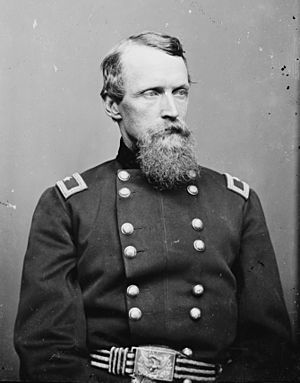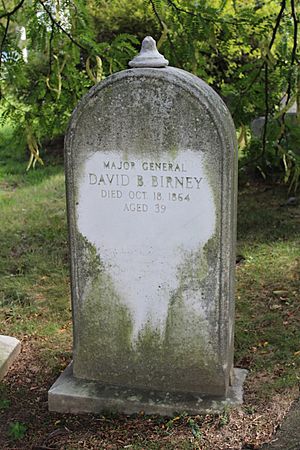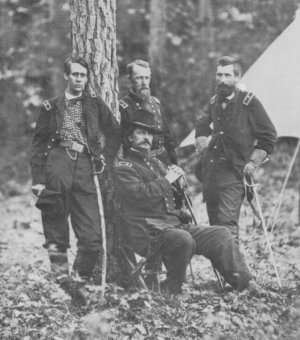David B. Birney facts for kids
Quick facts for kids
David Bell Birney
|
|
|---|---|

David B. Birney
|
|
| Born | May 29, 1825 Huntsville, Alabama, US |
| Died | October 18, 1864 (aged 39) Philadelphia, Pennsylvania, US |
| Place of burial |
Woodlands Cemetery, Philadelphia, Pennsylvania
|
| Allegiance | United States Union |
| Service/ |
United States Army Union Army |
| Years of service | 1861–1864 |
| Rank | |
| Commands held | X Corps |
| Battles/wars | American Civil War |
David Bell Birney (born May 29, 1825 – died October 18, 1864) was an important Union general during the American Civil War. Before the war, he worked as a businessman and a lawyer.
Contents
David Birney's Early Life
David Birney was born in Huntsville, Alabama. His father, James G. Birney, was from Kentucky and was an abolitionist. This means his father worked to end slavery.
In 1833, David's family moved back to Kentucky. There, his father freed the people he had enslaved. Two years later, in 1835, the family moved to Cincinnati. David's father started an anti-slavery newspaper there. Because of threats from people who supported slavery, the family moved again. They first went to Michigan and then finally settled in Philadelphia.
After finishing school at Phillips Academy, David Birney started working in business. He also studied law and became a lawyer. From 1856 until the Civil War began, he practiced law in Philadelphia.
Birney in the Civil War
David Birney joined the Union army right after the attack on Fort Sumter. He became a lieutenant colonel in the 23rd Pennsylvania Volunteer Infantry. He even used his own money to help create this unit. Before the war, he had studied military books to prepare for a role like this.
He quickly rose through the ranks. He became a colonel in August 1861 and a brigadier general in February 1862. He commanded a brigade in the III Corps. He led his troops during the Peninsula Campaign.
Challenges and Promotions
At the Battle of Seven Pines, Birney was accused of not following an order. He was said to have stopped his troops too far from the enemy. However, this was just a misunderstanding of orders. He faced a court-martial (a military trial). But with strong support from his commander, Philip Kearny, he was found innocent and kept his command.
Birney then led his brigade in the Seven Days Battles, especially at Glendale. He also fought at the Second Battle of Bull Run and the Battle of Chantilly. When General Kearny was killed at Chantilly, Birney took over command of his division.
His division missed the Battle of Antietam because they were in Washington, D.C.. But they returned to the main Union army for the Battle of Fredericksburg. Here, he again faced questions about his actions. He was accused of not supporting another division's attack. However, his corps commander praised him for how well he managed his division that day. So, he avoided punishment a second time.
Birney led his division in tough fighting at Chancellorsville. His division had more casualties (1,607 soldiers lost) than any other in the army. Because of his excellent service there, he was promoted to major general in May 1863.
Gettysburg and Later Campaigns

At the Battle of Gettysburg, the III Corps commander, Daniel Sickles, moved his troops forward. This created a dangerous, exposed position for the Union line. Confederate divisions attacked the III Corps from three sides. Birney's division was hit very hard and suffered many losses. After the battle, Birney took temporary command of the corps because Sickles was badly wounded. Birney himself had two minor wounds.
Birney then served as a division commander in the II Corps. This happened after his old III Corps was reorganized. He fought well in the Wilderness, Spotsylvania Court House, and Cold Harbor.
In July 1864, Ulysses S. Grant gave Birney command of the X Corps. This corps was part of the Army of the James.
Birney's Final Days
During the Siege of Petersburg, Birney became very sick with diarrhea. At first, it was not too bad, and he stayed in command. But in September, his health got much worse. He did not want to leave his duty. By October 7, he was so sick that he had to be carried in an ambulance. Doctors said he needed to go home right away.
He was taken to Philadelphia and became very confused. Doctors believed he had typhomalaria, a type of fever. David Birney died on October 18, 1864, after severe internal bleeding. It is thought he died from typhoid fever. He was buried in Woodlands Cemetery.
His older brother, William, also became a Union general.
Birney's Legacy
David Birney was known as one of the more successful "political generals" of the Civil War. These were generals who gained rank partly due to political connections. Some of his fellow officers did not like how quickly he rose in rank. He was not always popular with them or his soldiers.
Theodore Lyman, who worked for General Meade, described Birney:
He was a pale, Puritanical figure, with a demeanor of unmoveable coldness; only he would smile politely when you spoke to him. He was spare in person, with a thin face, light-blue eye, and sandy hair. As a General he took very good care of his Staff and saw they got due promotion. He was a man, too, who looked out for his own interests sharply and knew the mainspring of military advancement. His unpopularity among some persons arose partly from his own promotion, which, however, he deserved, and partly from his cold covert manner.
– Theodore Lyman
A public school in Philadelphia was named in Birney's honor. The Gen. David B. Birney School was built in 1912–1913. This building was added to the National Register of Historic Places in 1988.
 | James B. Knighten |
 | Azellia White |
 | Willa Brown |


